(1176 products available)





















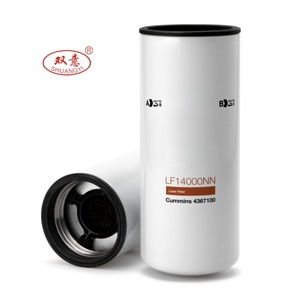
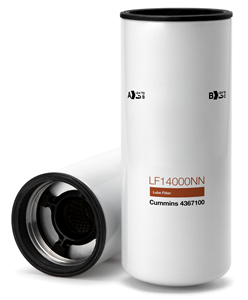
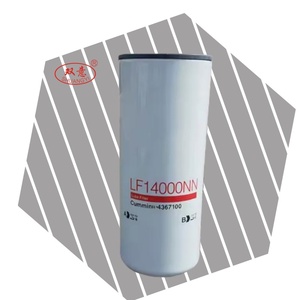
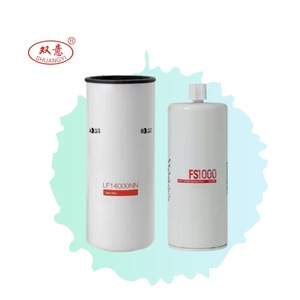
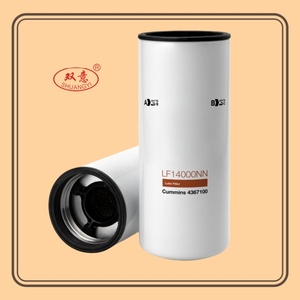
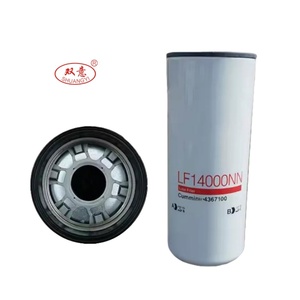



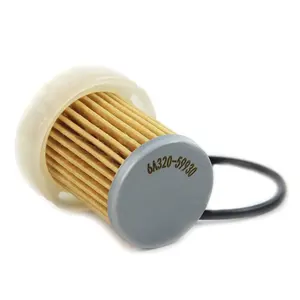
























































































































Kubota fuel filters are essential components designed to ensure the longevity and optimal performance of Kubota engines and machinery. These filters remove impurities and contaminants from the fuel, safeguarding the engine's internal components from wear and tear. Fuel filters are integral to diesel engines, given the fuel's high precision in handling and the need for clean quality to power heavy machinery.
There are three primary types of Kubota fuel filters, each catering to different needs and offering various solutions for maintaining fuel cleanliness.
Kubota fuel filter element
These are simple filtering units that trap impurities as fuel flows through them. They have a porous material that allows clean fuel to pass while blocking contaminants. Depending on the design, the filtering material may be paper, metal mesh, or other substances. They require regular replacement to maintain fuel cleanliness.
Kubota fuel filter housing
These are containers that hold the filter element and seal the fuel system. They connect to the fuel lines and maintain pressure. The housing prevents leaks and protects the filter from external damage. Some designs include a primer bulb for easy starting and a water drain for managing moisture.
Kubota fuel filter separator
These are specialized filters that remove water and larger particles from diesel fuel. They have a conical section where water and dirt settle, allowing easy drainage of accumulated water. Fuel filter separators improve fuel quality further, protecting the engine from water-related damage. Their placement in the fuel line ensures optimal performance and reliability.
Other types of Kubota fuel filters include the Kubota diesel fuel filter, which cleanses diesel fuel before entering the engine, and the Kubota oil filter, which prevents contaminants from entering the engine through the lubrication system. Additionally, there are Kubota engine fuel filters, which are standard in controlling fuel quality, and Kubota gasoline filters, which perform similar functions as diesel fuel filters but are designed specifically for gasoline-powered engines. All these filter types are essential in maintaining fuel quality and ensuring engine efficiency and longevity.
When purchasing fuel filters for resale, it is important to check the specifications and maintenance requirements. Here is a breakdown of what to expect.
Filter Media
This is the material used to capture debris in the fuel. Common options include cellulose, polyester, and metal mesh. Cellulose filters capture small particles but need frequent changes. Polyester filters trap fine particles and have good durability. Metal mesh filters are reusable but less effective at capturing tiny debris.
Micron Rating
This specification indicates the smallest particle size the fuel filter can remove. A lower micron rating means the filter catches smaller debris but may clog quickly. For Kubota engines, fuel filters with a micron rating of 5 to 10 are suitable.
Flow Rate
Measured in gallons per minute (GPM), the flow rate shows how much fuel passes through the filter. It should support the engine's fuel requirements without restricting flow. Kubota fuel filters have a flow rate of 1-2 GPM, depending on the model.
Housing Material
The case that holds the filter media needs to withstand fuel and pressure. Aluminum and plastic are common housing materials. Aluminum offers strength, while plastic is lightweight and corrosion resistant.
Service Interval
Kubota fuel filter maintenance is easy. To keep the engine in top condition, check the service interval. This is the recommended time to change the filter. With regular use of clean fuel, the service interval for Kubota fuel filters is 500 to 800 engine hours or every six months, whichever comes first. However, the service interval may vary depending on the operating conditions.
Compatibility
Different Kubota engine models use specific fuel filters. Resellers should ensure their filters match the engine code. Using incompatible filters can lead to engine performance issues.
Choosing the right kubota fuel filter involves considering several factors to ensure optimal engine performance and longevity. Here are some tips:
Below are the steps on how to replace the Kubota fuel filter:
Safety precautions
Before starting the process, it is important to read the operator's manual. The manual has specific safety precautions for the particular model being used. After knowing the precautions, work in a well-ventilated area, away from open flames or sparks, and wear safety glasses and gloves for protection.
Gather necessary tools and materials
Get the right fuel filter as per the specifications in the operator's manual. The new fuel filter should match the old one in shape and size. Prepare tools that will be needed for the process, such as wrenches, pliers, and a fuel line disconnect tool. Have some diesel fuel on hand to prime the new filter before installation. Also, have rags ready to clean up any spilled fuel during the process.
Prepare the vehicle
Before starting the process, ensure the engine is turned off and allowed to cool down. This will prevent accidents that may arise due to the engine being hot when changing fuel filters. Also, disconnect the battery's negative terminal to avoid electrical issues and ensure the fuel system's pressure is released by following the manual's instructions.
Remove the old fuel filter
Locate the fuel filter by following the manual's instructions. After that, use the appropriate tools to loosen and remove any clamps or fasteners holding the filter in place. Then disconnect the fuel lines from the filter. Note the orientation of the old filter and ensure the new one is installed the same way. Also, ensure that the O-rings or seals on the fuel lines and fittings are in good condition.
Install the new fuel filter
Before installing the new fuel filter, prime it with diesel fuel. This helps the filter to trap fuel before starting its work. Then, install the new filter into its mounting and tighten the clamps or fasteners. Ensure that the fuel lines and fittings are properly connected and free from leaks. After installing the new filter successfully, reconnect the battery's negative terminal.
Test the fuel system
Start the engine and ensure it runs smoothly. Check the connections around the new filter for any signs of fuel leaks. If leaks are detected, turn off the engine and correct the issue before continuing to use the machine.
Q1: What does a fuel filter do?
A1: A fuel filter traps dirt, rust, and other contaminants to prevent them from reaching the engine. By filtering the fuel, the Kubota fuel filter protects the engine from damage and helps maintain optimal performance.
Q2: How often should a fuel filter be replaced?
A2: The replacement interval for a fuel filter depends on factors like usage, environment, and type of filter. As a general guideline, it's recommended to change the fuel filter every 2 years or 20,000 to 40,000 kilometers. However, users should check the specific recommendations in the Kubota fuel filter parts manual.
Q3: Can a fuel filter be reused?
A3: No, fuel filters are designed as disposable components. Once they become saturated with contaminants, they lose their filtering ability. Reusing a fuel filter could allow dirt and debris to enter the engine, causing damage and degrading performance over time.
Q4: What are the signs of a clogged fuel filter?
A clogged fuel filter restricts fuel flow to the engine, leading to symptoms like poor acceleration, engine hesitation, rough idle, difficulty starting, and decreased overall performance. If any of these issues occur, check the fuel filter as it may need replacement.
Q5: Can users change the fuel filter themselves?
A5: Yes, changing the fuel filter is a relatively straightforward task that can be done with basic tools. However, users should follow the instructions in the Kubota fuel filter parts manual. It's important to use the correct filter for the engine model and take care not to introduce contaminants during the replacement process.